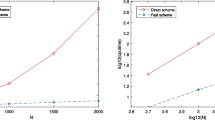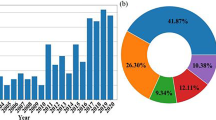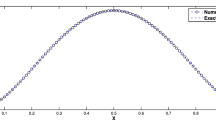Abstract
In this paper, a fractional differential equation with integral conditions is studied. The fractional differential equation is transformed into an integral equation with two initial values, where the initial values needs to ensure that the exact solution satisfies the integral boundary conditions. A graded mesh based on a priori information of the exact solution is constructed and the linear interpolation is used to approximate the functions in the fractional integral. The rigorous analysis about the convergence of the discretization scheme is derived by using the truncation error estimate techniques and the generalized Grönwall inequality. A quasi-Newton method is used to determine the initial values so that the numerical solution satisfies two integral boundary conditions within a prescribed precision. It is shown that the scheme is second-order convergent, which improves the results on the uniform mesh.
Similar content being viewed by others
Data availability
Data sharing is not applicable to this article as no datasets were generated or analyzed during the current study.
References
A. Seal, S. Natesan, Convergence analysis of a second-order scheme for fractional differential equation with integral boundary conditions. J. Appl. Math. Comput. 69, 465–489 (2023)
K. Diethlm, The Analysis of Fractional Differential Equations, Lecture Notes in Mathematics, vol. 2004. (Springer, Berlin, 2010)
I. Podlubny, Fractional Differential Equations (Academic Press, New York, 1999)
A.A. Kilbas, H.M. Srivastaval, J.J. Trujillo, Theory and Applications of Fractional Differential Equations, North-Holland Mathematics Studies, vol. 204 (Elsevier, Amsterdam, 2006)
M. Stynes, J.L. Gracia, A finite difference method for a two-point boundary value problem with a Caputo fractional derivative. IMA J. Numer. Anal. 35(2), 689–721 (2015)
J.L. Gracia, M. Stynes, Central difference approximation of convection in Caputo fractional derivative two-point boundary value problems. J. Comput. Appl. Math. 273, 103–115 (2015)
N. Kopteva, M. Stynes, An efficient collocation method for a Caputo two-point boundary value problem. BIT 55(4), 1105–1123 (2015)
H. Liang, M. Stynes, Collocation methods for general Caputo two-point boundary value problems. J. Sci. Comput. 76, 390–425 (2018)
Z. Cen, J. Huang, A. Xu, An efficient numerical method for a two-point boundary value problem with a Caputo fractional derivative. J. Comput. Appl. Math. 336, 1–7 (2018)
Z. Cen, J. Huang, A. Xu, A. Le, A modified integral discretization scheme for a two-point boundary value problem with a Caputo fractional derivative. J. Comput. Appl. Math. 367, 112465 (2020)
M.M. Meerschaert, C. Tadjeran, Finite difference approximations for fractional advection-dispersion flow equation. J. Comput. Appl. Math. 172(1), 65–77 (2004)
N.H. Sweilam, A.A.E. El-Sayed, S. Boulaaras, Fractional-order advection-dispersion problem solution via the spectral collocation method and the non-standard finite difference technique. Chaos Solitons Fractals 144, 110736 (2021)
N.H. Sweilam, M.M. Khader, M. Adel, Chebyshev pseudo-spectral method for solving fractional advection-dispersion equation. Appl. Math. 5(19), 3240–3248 (2014)
V. Saw, S. Kumar, Fourth kind shifted Chebyshev polynomials for solving space fractional order Advection-dispersion equation based on collocation method and finite difference Approximation, Int. J. Appl. Comput. Math., 4 (2018) Article number 82
V. Saw, S. Kumar, Second kind Chebyshev polynomials for solving space fractional advection-dispersion equation using collocation method. Iran. J. Sci. Technol. Trans. Sci. 43(3), 1027–1037 (2019)
M.M. Khader, N.H. Sweilam, Approximate solutions for the fractional advection-dispersion equation using Legendre pseudo-spectral method. Comput. Appl. Math. 33, 739–750 (2014)
J.P. Roop, Numerical approximation of a one-dimensional space fractional advection-dispersion equation with boundary layer. Comput. Math. Appl. 56, 1808–1819 (2008)
M.O. Deville, A. Mojtabi, One-dimensional linear advection-diffusion equation: analytical and finite element solutions. Comput. Fluids 107, 189–195 (2014)
L.K. Gadzova, Nonlocal boundary-value problem for a linear ordinary differential equation with fractional discretely distributed differentiation operator. Math. Notes 106, 904–908 (2019)
S.J.C. Mary, A. Tamilselvan, Numerical method for a non-local boundary value problem with Caputo fractional order. J. Appl. Math. Comput. 67, 1–17 (2021)
N. Kopteva, M. Stynes, Analysis and numerical solution of a Riemann-Liouville fractional derivative two-point boundary value problem. Adv. Comput. Math. 43, 77–99 (2017)
P. Lyu, S. Vong, A high-order method with a temporal nonuniform mesh for a time-fractional Benjamin-Bona-Mahony equation. J. Sci. Comput. 80, 1607–1628 (2019)
C.P. Li, Q. Yi, A. Chen, Finite difference methods with non-uniform meshes for nonlinear fractional differential equations. J. Comput. Phys. 316, 614–631 (2016)
Acknowledgements
We would like to thank the anonymous reviewers for their valuable suggestions and comments for the improvement of this paper.
Funding
The work was supported by Zhejiang Provincial Natural Science Foundation of China (Grant Nos. LGF22H260003, LTGY23H240002), Zhejiang Province Higher Education Teaching Reform Project (Grant Nos. jg20220457, jg20220466), and Ningbo Municipal Natural Science Foundation (Grant No. 2023J302).
Author information
Authors and Affiliations
Contributions
The first author carried out the literature review, designed the numerical algorithm, and wrote the main manuscript text. The second author conducted numerical experiments and participated in designing the numerical algorithm, and the third author participated in analyzing the error and designing the numerical algorithm. All authors reviewed and approved the final manuscript.
Corresponding author
Ethics declarations
Conflict of interest
The authors declare that they have no known competing financial interests or personal relationships that could have appeared to influence the work reported in this paper.
Additional information
Publisher's Note
Springer Nature remains neutral with regard to jurisdictional claims in published maps and institutional affiliations.
Rights and permissions
Springer Nature or its licensor (e.g. a society or other partner) holds exclusive rights to this article under a publishing agreement with the author(s) or other rightsholder(s); author self-archiving of the accepted manuscript version of this article is solely governed by the terms of such publishing agreement and applicable law.
About this article
Cite this article
Cen, Z., Huang, J. & Xu, A. An integral discretization scheme on a graded mesh for a fractional differential equation with integral boundary conditions. J Math Chem (2024). https://doi.org/10.1007/s10910-024-01596-7
Received:
Accepted:
Published:
DOI: https://doi.org/10.1007/s10910-024-01596-7
Keywords
- Fractional differential equation
- Caputo fractional derivative
- Integral boundary conditions
- Grönwall inequality
- Graded mesh




